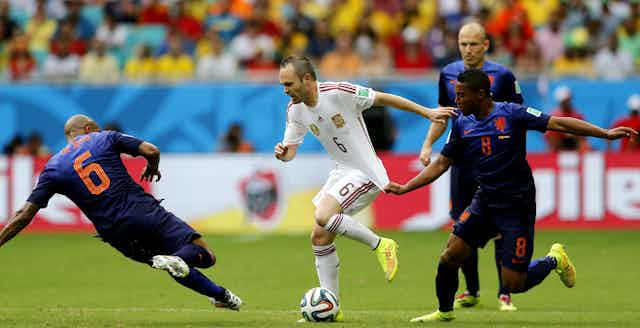Spain is out of the World Cup. They have a final consolation game against Australia, who were on the wrong end of a thrilling 3-2 defeat to Netherlands, but the biggest upset is the exit of the cup holders following their first-round 5-1 thrashing at the hands of Netherlands and then a 2-0 defeat to surprise package Chile.
How could this be? For the past few years, Spain have been the dominant team in international football: they are reigning European and World champions. Their dominance was built on the “tiki-taka” style of play that emphasises ball retention and a fast-flowing, highly fluid, short passing game.
Many considered Spain to have ended the debate once and for all over the relative merits between possession football and the long-ball game. For purists who want to see the beautiful game played that way, Spain symbolised the triumph of the artist over the artisan. Or so it seemed until the Netherlands beat Spain with a much more direct style of play.
When it comes to assessing styles of football, we can only judge this cup by the first round – so, what do the statistics say?
The statistics of Spain’s first-round match bear out two very different styles of play. Spain completed 566 passes; the Netherlands just 318. The contrast is even starker for short passes. Spain completed 200 short passes, the most by any team in the first round of games whereas the Netherlands completed only 69, the second lowest in the tournament so far. The Netherlands completed 64 long passes, the second-most in the first round of games while Spain only completed 40. The long-ball game triumphed over tiki-taka and the tactical debate is reignited.
Only one game
Perhaps a first step in getting some perspective on the merits of the Spanish style of play is to put their performance in the context of the passing statistics for all of the first round of games. Table 1 shows the averages for completed passes for all teams, winning teams and losing teams. What is very clear is that winning teams complete significantly more passes than losing teams. Winning teams have averaged 464 completed passes compared to only 355 completed passes by losing teams. The difference is statistically significant. However, when broken down by type of pass, although winning teams tend to make more completed passes in all categories, only the difference in the number of completed medium passes is statistically significant.
In other words there is no strong evidence either way in support of the relative importance of short passes and long passes. Generally, winning teams make more completed passes of all lengths.

Looking at the six top performances by completed passes in the first round of games, summarised in Table 2, five out of six of these were by winning teams with Spain as the only losing team. France made the most completed passes in the first round of games with 624 completed passes against Honduras, although the overwhelming French dominance in the game was assisted by Honduras playing more than half of the game with 10 men.
The third most completed passes in the first round of games was by Italy with 606 completed passes against England. Italy’s playmaker, Pirlo, completed 103 passes but he was not their top passer – De Rossi completed 105. England’s two top passers were the Liverpool pair of Johnson (62 completed passes) and Gerrard (61 completed passes). England, so long associated with the long-ball game, completed 467 passes, just above the average for winning teams. And England’s pass completion rate was 85.9%, well above the average across all teams of 76.6% and ranked third behind France (87.0%) and, crucially, Italy (89.3%). So despite the defeat there are grounds for optimism for England’s chances of progressing in the tournament.

So yes Spain’s early exit is a major shock, but doesn’t mean we should write off the effectiveness of tiki-taka football. Indeed, winning teams generally retain the ball better than their opponents and complete more passes.
But of course it is not just having the ball and retaining possession that wins games, it is using the ball to create scoring opportunities that are converted. And this depends on a blend of passes, and choosing and executing the right pass in any given situation. The convincing wins by the Netherlands and Chile certainly demonstrated that it is not the quantity but the quality of passing (and converting opportunities in front of goal) that really matters.

